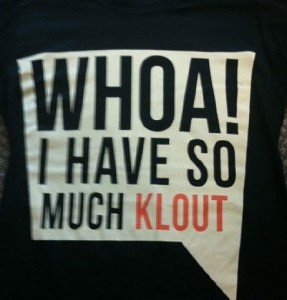 Today marks the launch of a new series, “What Is Influence?” The concept came from the many in-depth comments delivered on the April 20 blog post about Klout. There seems to be two camps re Klout (the first mover, for all intents and purposes) for gauging influence scoring — one dissects the algorithm and the analytics behind the score and discredits that number; the other (camp) looks ahead at the significance and potential impact an influencer score will have on the industry at large. I’m of the latter camp…methinks Klout and other influence assessment via metrics and scores will change the face of business development and marketing.
Today marks the launch of a new series, “What Is Influence?” The concept came from the many in-depth comments delivered on the April 20 blog post about Klout. There seems to be two camps re Klout (the first mover, for all intents and purposes) for gauging influence scoring — one dissects the algorithm and the analytics behind the score and discredits that number; the other (camp) looks ahead at the significance and potential impact an influencer score will have on the industry at large. I’m of the latter camp…methinks Klout and other influence assessment via metrics and scores will change the face of business development and marketing.
Mark W. Schaefer, one of the most consummate B-to-B marketers I’ve had the privilege of “growing” with, suggests Klout-type apps are not to be taken lightly. Mark says:
At the end of the day, influence is your ability to change another person’s view, attitude or behavior. That is why systems like Klout are so important to marketers. For the first time in history we can proximate (not necessarily quantify) word of mouth influence. That is a huge insight. Revolutionary. So no matter what you think of Klout from a personal standpoint, you need to pay attention from a business standpoint because it is an important development – a step toward measurement that will improve steadily.
To refresh what I said in the Klout blog last week, I defined influence as “authoritative, authentic, and accessible leadership.”
An opinion column in Advertising Age Feb. 28, 2011 by Greg Shove, founder and CEO of Halogen Media Group, said some pertinent things in his piece about influence metrics as they relate to traditional web publishing. I don’t want to take his opinions out of context, but he shares that Klout scoring is affecting online publishing; sites too large to be nimble and authentic are suffering. I’m fascinated with his remarks, pulled from his piece:
** “Being held to influence-measurement standards set by services such as Klout is the next blow that’s coming around the corner. Get ready for the next digital media bloodbath.
** Influence metrics will show that most big, blue-chip sites don’t have the same social influence that smaller, more authentic sites do.
** Though in its infancy, this shift to influence measurement will ultimately benefit publishers that cultivate and curate influence. I’d (Greg Shove) go so far as to call this ‘authentic media’ or the ‘authentic web,’ defined by the quality, passion and influence of their editorial and their audiences.”
Opinions about influence will vary as widely as the definitions I got to help me define public relations in the recent 15-post series done on this blog. I have invited my peers, with whom I engage every day, to provide their thoughts on defining influence.
Gini Dietrich, an extraordinary and impressive social media maven who blogs at Spin Sucks and will soon launch Spin Sucks Pro, says:
I define influence as a person or group of people who affect change around a product, service, industry, or cause. Your influencers are typically not the same as mine and vice versa. That’s why the issue of things like Klout doesn’t work because it’s not based on reality.
For instance, my Klout score is higher than Jay Leno’s, which is absolutely ridiculous because he is a household name and clearly has more influence. But, in certain circles (PR, especially), I definitely have more influence than Leno.
Finding your influencers takes a lot of hard work, time, commitment, and patience. There aren’t tools that effectively make it easy for you to find them. You have to research, dig, read, review, monitor, listen, and then do it all again to maintain the relationships. The only way to measure that is to benchmark what you are asking the influencers to do against your business goals. It’s the only way.
I’m eager and excited to see how this goes! With that comes a hearty thank you and sincere gratitude for your contributions here to make this blog come alive more each day. I appreciate everyone for visiting, sharing, and ‘raderie.
(Image: ShoutMeLoud)









